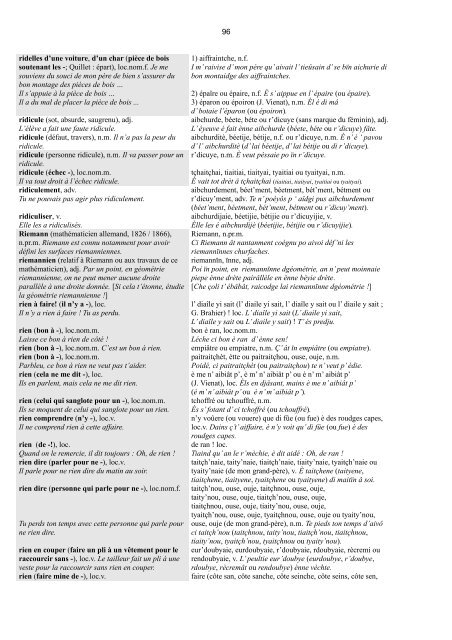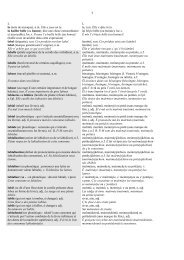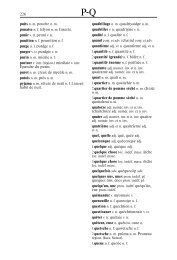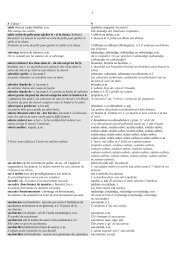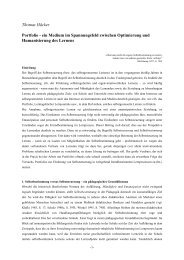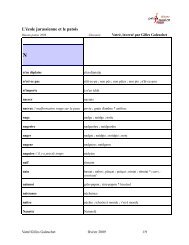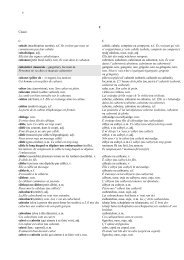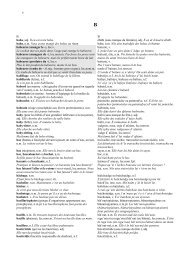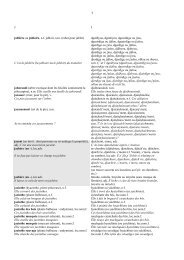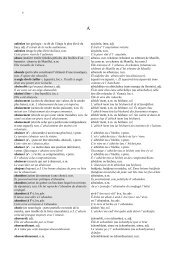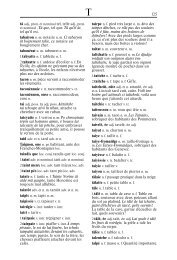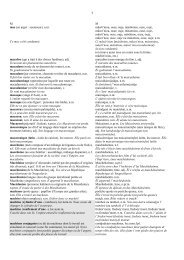R Classé ! R ra (onomatopée : coup de baguette ... - Image du Jura
R Classé ! R ra (onomatopée : coup de baguette ... - Image du Jura
R Classé ! R ra (onomatopée : coup de baguette ... - Image du Jura
Create successful ePaper yourself
Turn your PDF publications into a flip-book with our unique Google optimized e-Paper software.
i<strong>de</strong>lles d’une voiture, d’un char (pièce <strong>de</strong> bois<br />
soutenant les -; Quillet : épart), loc.nom.f. Je me<br />
souviens <strong>du</strong> souci <strong>de</strong> mon père <strong>de</strong> bien s’assurer <strong>du</strong><br />
bon montage <strong>de</strong>s pièces <strong>de</strong> bois …<br />
Il s’appuie à la pièce <strong>de</strong> bois …<br />
Il a <strong>du</strong> mal <strong>de</strong> placer la pièce <strong>de</strong> bois ...<br />
1) aiff<strong>ra</strong>intche, n.f.<br />
I m’ <strong>ra</strong>ivise d’ mon pére qu’ aivait l’ tieûsain d’ se bïn aichurie di<br />
bon montaidge <strong>de</strong>s aiff<strong>ra</strong>intches.<br />
2) épaîre ou épaire, n.f. È s’ aippue en l’ épaire (ou épaire).<br />
3) éparon ou époiron (J. Vienat), n.m. Èl é di mâ<br />
d’ botaie l’éparon (ou époiron).<br />
aibchur<strong>de</strong>, béete, béte ou r’dicuye (sans marque <strong>du</strong> féminin), adj.<br />
L’ éyeuve é fait ènne aibchur<strong>de</strong> (béete, béte ou r’dicuye) fâte.<br />
aibchurditè, béetije, bétije, n.f. ou r’dicuye, n.m. È n’ é ‘ pavou<br />
d’ l’ aibchurditè (d’ lai béetije, d’ lai bétije ou di r’dicuye).<br />
r’dicuye, n.m. È veut péssaie po ïn r’dicuye.<br />
ridicule (sot, absur<strong>de</strong>, saugrenu), adj.<br />
L’élève a fait une faute ridicule.<br />
ridicule (défaut, t<strong>ra</strong>vers), n.m. Il n’a pas la peur <strong>du</strong><br />
ridicule.<br />
ridicule (personne ridicule), n.m. Il va passer pour un<br />
ridicule.<br />
ridicule (échec -), loc.nom.m.<br />
tçhaitçhai, tiaitiai, tiaityai, tyaitiai ou tyaityai, n.m.<br />
Il va tout droit à l’échec ridicule.<br />
È vait tot drèt â tçhaitçhai (tiaitiai, tiaityai, tyaitiai ou tyaityai).<br />
ridiculement, adv.<br />
aibchur<strong>de</strong>ment, béet’ment, béetment, bét’ment, bétment ou<br />
Tu ne pouvais pas agir plus ridiculement.<br />
r’dicuy’ment, adv. Te n’ poéyôs p ‘ aîdgi pus aibchur<strong>de</strong>ment<br />
(béet’ment, béetment, bét’ment, bétment ou r’dicuy’ment).<br />
ridiculiser, v.<br />
aibchurdijaie, béetijie, bétijie ou r’dicuyijie, v.<br />
Elle les a ridiculisés.<br />
Èlle les é aibchurdijè (béetijie, bétijie ou r’dicuyijie).<br />
Riemann (mathématicien allemand, 1826 / 1866), Riemann, n.pr.m.<br />
n.pr.m. Riemann est connu notamment pour avoir Ci Riemann ât nantanment coégnu po aivoi déf’ni les<br />
défini les surfaces riemanniennes.<br />
riemannïnnes churfaches.<br />
riemannien (relatif à Riemann ou aux t<strong>ra</strong>vaux <strong>de</strong> ce riemannïn, ïnne, adj.<br />
mathématicien), adj. Par un point, en géométrie Poi ïn point, en riemannïnne dgéométrie, an n’ peut moinnaie<br />
riemannienne, on ne peut mener aucune droite piepe ènne drète pairâllèle en ènne bèyie drète.<br />
pa<strong>ra</strong>llèle à une droite donnée. [Si cela t’étonne, étudie<br />
la géométrie riemannienne !]<br />
[Che çoli t’ ébâbât, <strong>ra</strong>icodge lai riemannïnne dgéométrie !]<br />
rien à faire! (il n’y a -), loc.<br />
l’ diaîle yi sait (l’ diaile yi sait, l’ diaîle y sait ou l’ diaile y sait ;<br />
Il n’y a rien à faire ! Tu as per<strong>du</strong>.<br />
G. B<strong>ra</strong>hier) ! loc. L’ diaîle yi sait (L’ diaile yi sait,<br />
L’ diaîle y sait ou L’ diaile y sait) ! T’ és predju.<br />
rien (bon à -), loc.nom.m.<br />
bon è <strong>ra</strong>n, loc.nom.m.<br />
Laisse ce bon à rien <strong>de</strong> côté !<br />
Léche ci bon è <strong>ra</strong>n d’ ènne sen!<br />
rien (bon à -), loc.nom.m. C’est un bon à rien. empiâtre ou empiatre, n.m. Ç’ ât ïn empiâtre (ou empiatre).<br />
rien (bon à -), loc.nom.m.<br />
pait<strong>ra</strong>itçhèt, ètte ou pait<strong>ra</strong>itçhou, ouse, ouje, n.m.<br />
Parbleu, ce bon à rien ne veut pas t’ai<strong>de</strong>r.<br />
Poidé, ci pait<strong>ra</strong>itçhèt (ou pait<strong>ra</strong>itçhou) te n’ veut p’ édie.<br />
rien (cela ne me dit -), loc.<br />
è me n’ aibiât p’, è m’ n’ aibiât p’ ou è n’ m’ aibiât p’<br />
Ils en parlent, mais cela ne me dit rien.<br />
(J. Vienat), loc. Èls en djâsant, mains è me n’ aibiât p’<br />
(è m’ n’ aibiât p’ ou è n’ m’ aibiât p’).<br />
rien (celui qui sanglote pour un -), loc.nom.m. tchoffré ou tchouffré, n.m.<br />
Ils se moquent <strong>de</strong> celui qui sanglote pour un rien. Ès s’ fotant d’ ci tchoffré (ou tchouffré).<br />
rien comprendre (n’y -), loc.v.<br />
n’y voûere (ou vouere) que di fûe (ou fue) è <strong>de</strong>s roudges capes,<br />
Il ne comprend rien à cette affaire.<br />
loc.v. Dains ç’t’ aiffaire, è n’y voit qu’ di fûe (ou fue) è <strong>de</strong>s<br />
roudges capes.<br />
rien (<strong>de</strong> -!), loc.<br />
<strong>de</strong> <strong>ra</strong>n ! loc.<br />
Quand on le remercie, il dit toujours : Oh, <strong>de</strong> rien ! Tiaind qu’ an le r’mèchie, è dit aidé : Oh, <strong>de</strong> <strong>ra</strong>n !<br />
rien dire (parler pour ne -), loc.v.<br />
taitçh’naie, taity’naie, tiaitçh’naie, tiaity’naie, tyaitçh’naie ou<br />
Il parle pour ne rien dire <strong>du</strong> matin au soir.<br />
tyaity’naie (<strong>de</strong> mon g<strong>ra</strong>nd-père), v. È taitçhene (taityene,<br />
tiaitçhene, tiaityene, tyaitçhene ou tyaityene) di maitïn â soi.<br />
rien dire (personne qui parle pour ne -), loc.nom.f. taitçh’nou, ouse, ouje, taitçhnou, ouse, ouje,<br />
taity’nou, ouse, ouje, tiaitçh’nou, ouse, ouje,<br />
tiaitçhnou, ouse, ouje, tiaity’nou, ouse, ouje,<br />
tyaitçh’nou, ouse, ouje, tyaitçhnou, ouse, ouje ou tyaity’nou,<br />
Tu perds ton temps avec cette personne qui parle pour ouse, ouje (<strong>de</strong> mon g<strong>ra</strong>nd-père), n.m. Te pieds ton temps d’aivô<br />
ne rien dire.<br />
ci taitçh’nou (taitçhnou, taity’nou, tiaitçh’nou, tiaitçhnou,<br />
tiaity’nou, tyaitçh’nou, tyaitçhnou ou tyaity’nou).<br />
rien en <strong>coup</strong>er (faire un pli à un vêtement pour le eur’doubyaie, eurdoubyaie, r’doubyaie, rdoubyaie, rècremi ou<br />
<strong>ra</strong>ccourcir sans -), loc.v. Le tailleur fait un pli à une rendoubyaie, v. L’ peultie eur’doubye (eurdoubye, r’doubye,<br />
veste pour la <strong>ra</strong>ccourcir sans rien en <strong>coup</strong>er. rdoubye, rècremât ou rendoubye) ènne vèchte.<br />
rien (faire mine <strong>de</strong> -), loc.v. faire (côte san, côte sanche, côte seinche, côte seins, côte sen,<br />
96


